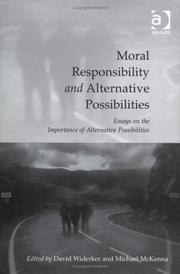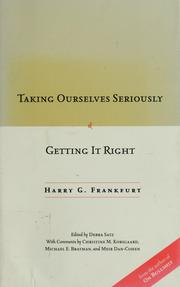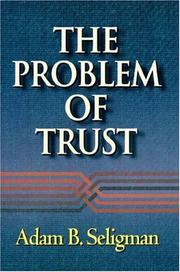| Listing 1 - 6 of 6 |
Sort by
|

ISBN: 0262025132 0262528134 0262269597 0585437017 0262294001 9780262269599 9780585437019 9780262025133 9780262528139 Year: 2002 Publisher: Cambridge (Mass.): MIT press
Abstract | Keywords | Export | Availability | Bookmark
 Loading...
Loading...Choose an application
- Reference Manager
- EndNote
- RefWorks (Direct export to RefWorks)
The original essays in this book address Harry Frankfurt's influential writing on personal identity, love, value, moral responsibility, and the freedom and limits of the human will. Many of Frankfurt's deepest insights come from exploring the self-reflective nature of human agents and the psychic conflicts that self-reflection often produces. His work has informed discussions in metaphysics, metaethics, normative ethics, and action theory. The authors, recognized for their own contributions to the understanding of human agency, defend their original philosophical positions at the same time that they respond to Frankfurt's. Each essay is followed by a response from Frankfurt, in which he clarifies and elaborates on his views.
Philosophical anthropology --- Frankfurt, Harry --- Act (Philosophy) --- Agent (Philosophy) --- Agency (Philosophy) --- Agents --- Person (Philosophy) --- Philosophy --- Action (Philosophy) --- Frankfurt, Harry G. --- Philosophy & Religion --- Frankfurt, Harry G., --- פרנקפורט, הארי ג׳, --- PHILOSOPHY/General --- Act (Philosophy) - Congresses. --- Agent (Philosophy) - Congresses. --- Frankfurt, Harry Gordon,

ISBN: 0754604950 0754656985 Year: 2003 Publisher: Aldershot Ashgate
Abstract | Keywords | Export | Availability | Bookmark
 Loading...
Loading...Choose an application
- Reference Manager
- EndNote
- RefWorks (Direct export to RefWorks)
General ethics --- Responsibility --- Free will and determinism --- Responsabilité --- Libre arbitre et déterminisme --- Frankfurt, Harry G., --- Accountability --- Moral responsibility --- Obligation --- Ethics --- Supererogation --- Compatibilism --- Determinism and free will --- Determinism and indeterminism --- Free agency --- Freedom and determinism --- Freedom of the will --- Indeterminism --- Liberty of the will --- Determinism (Philosophy) --- Frankfurt, Harry G. --- Responsabilité --- Libre arbitre et déterminisme --- פרנקפורט, הארי ג׳, --- Frankfurt, Harry Gordon,
Book
ISBN: 9780199899203 Year: 2012 Publisher: New York Oxford university press
Abstract | Keywords | Export | Availability | Bookmark
 Loading...
Loading...Choose an application
- Reference Manager
- EndNote
- RefWorks (Direct export to RefWorks)
Free will and determinism --- Responsibility --- Accountability --- Moral responsibility --- Obligation --- Ethics --- Supererogation --- Compatibilism --- Determinism and free will --- Determinism and indeterminism --- Free agency --- Freedom and determinism --- Freedom of the will --- Indeterminism --- Liberty of the will --- Determinism (Philosophy) --- Frankfurt, Harry G., --- פרנקפורט, הארי ג׳, --- Frankfurt, Harry Gordon, --- Free will and determinism. --- Responsibility. --- Frankfurt, Harry G.
Book
ISBN: 9789028962712 9789086870783 Year: 2011 Volume: 69 Publisher: Kapellen Pelckmans
Abstract | Keywords | Export | Availability | Bookmark
 Loading...
Loading...Choose an application
- Reference Manager
- EndNote
- RefWorks (Direct export to RefWorks)
Act (Philosophy) --- Acte (philosophie de l'action) --- Action (Philosophie de l') --- Action (Philosophie) --- Action (Philosophy) --- Activité (philosophie) --- Agency (Philosophy) --- Agent (Philosophy) --- Agents --- Agir (philosophie) --- Handeling (Filosofie) --- Person (Philosophy) --- Personne (Philosophie) --- Persoon (Filosofie) --- Philosophie de l'action --- Franfurt, Harry G. --- Philosophy --- Frankfurt, Harry

ISBN: 9780804752985 0804752982 Year: 2006 Publisher: Stanford (Calif.) Stanford university press
Abstract | Keywords | Export | Availability | Bookmark
 Loading...
Loading...Choose an application
- Reference Manager
- EndNote
- RefWorks (Direct export to RefWorks)
"Harry G. Frankfurt begins his inquiry by asking, "What is it about human beings that makes it possible for us to take ourselves seriously?" "The first section of the book consists of the two lectures. The second section consists of comments in response by Christine M. Korsgaard, Michael E. Bratman, and Meir Dan-Cohen."--Jacket.
Philosophical anthropology --- Amour. --- Conduct of life. --- Lebensführung. --- Liebe. --- Liefde. --- Love. --- Moi (Psychologie). --- Morale pratique. --- Praktische Vernunft. --- Rationaliteit. --- Reflection (Philosophy). --- Reflexion --- Réflexion (Philosophie). --- Selbst. --- Selbstreflexion. --- Self. --- Sorge. --- Vernunft. --- (Philos.). --- Frankfurt, Harry G. --- Conduct of life --- Love --- Reflection (Philosophy) --- Self --- Philosophy --- Affection --- Emotions --- First loves --- Friendship --- Intimacy (Psychology) --- Personal identity --- Consciousness --- Individuality --- Mind and body --- Personality --- Thought and thinking --- Will --- Ethics, Practical --- Morals --- Personal conduct --- Ethics --- Philosophical counseling

ISBN: 0691050201 0691012423 1400822378 1400813360 9780691050201 9780691012421 Year: 2000 Publisher: Princeton (N.J.): Princeton university press,
Abstract | Keywords | Export | Availability | Bookmark
 Loading...
Loading...Choose an application
- Reference Manager
- EndNote
- RefWorks (Direct export to RefWorks)
The problem of trust in social relationships was central to the emergence of the modern form of civil society and much discussed by social and political philosophers of the early modern period. Over the past few years, in response to the profound changes associated with postmodernity, trust has returned to the attention of political scientists, sociologists, economists, and public policy analysts. In this sequel to his widely admired book, The Idea of Civil Society, Adam Seligman analyzes trust as a fundamental issue of our present social relationships. Setting his discussion in historical and intellectual context, Seligman asks whether trust--which many contemporary critics, from Robert Putnam through Francis Fukuyama, identify as essential in creating a cohesive society--can continue to serve this vital role.Seligman traverses a wide range of examples, from the minutiae of everyday manners to central problems of political and economic life, showing throughout how civility and trust are being displaced in contemporary life by new "external' system constraints inimical to the development of trust. Disturbingly, Seligman shows that trust is losing its unifying power precisely because the individual, long assumed to be the ultimate repository of rights and values, is being reduced to a sum of group identities and an abstract matrix of rules. The irony for Seligman is that, in becoming postmodern, we seem to be moving backward to a premodern condition in which group sanctions rather than trust are the basis of group life.
Political sociology --- Political systems --- Social psychology --- #SBIB:35H501 --- 316.47.052 --- Bestuur en samenleving: netwerken, inspraak, participatie, interactief beleid --- Vertrouwen in sociale relaties --- 316.47.052 Vertrouwen in sociale relaties --- Social role --- Role, Social --- Social interaction. --- Trust. --- Social role. --- Social interaction --- Trust --- Human interaction --- Interaction, Social --- Symbolic interaction --- Trust (Psychology) --- Social status --- Exchange theory (Sociology) --- Psychology --- Attitude (Psychology) --- Emotions --- Agape. --- Appadurai, Arjun, "ed. --- Arendt, Hannah. --- Axial chasm. --- Banfield, Edward. --- Benhabib, Seyla. --- Bernstein, Basil. --- Boden, Deirdre. --- Bynum, Caroline. --- Calvinism. --- Cambridge Platonists. --- Catholicism. --- Christianity. --- Constant, Benjamin. --- Diderot, Denis, "ed. --- Douglas, Mary. --- Durkheim, Emile. --- Elias, Norbert. --- Frankfurt, Harry. --- Ghana, Frafas people of. --- Grief, Avner. --- Harrison, Bernard, "ed. --- Herman, Gabriel. --- Kahneman, Daniel. --- Lasch, Christopher. --- Macfarlane, Alan. --- Maza, Sarah. --- Merton, Robert. --- Otto, Rudolf. --- Protestantism. --- Puritanism. --- asceticism. --- associational life. --- baptism, private. --- capitalism. --- citizenship. --- civility. --- communitarianism. --- confidence. --- contract law. --- credit, symbolic. --- divorce. --- expectation, trust as. --- externality. --- familiarity. --- friendship. --- game theory. --- honor. --- incivisme. --- marriage. --- networks, of trust. --- postmodernity. --- Rol social. --- Interacción social. --- Interaction sociale --- Role (Sociology) --- Confiance --- Rôle social
| Listing 1 - 6 of 6 |
Sort by
|

 Search
Search Feedback
Feedback About UniCat
About UniCat  Help
Help News
News